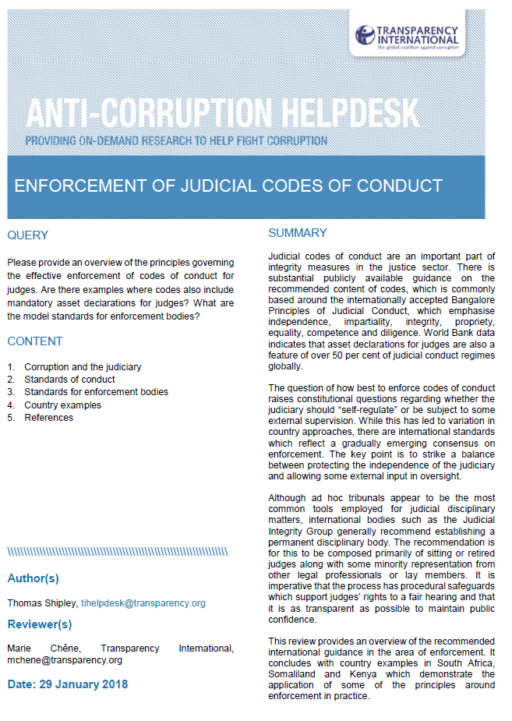
This Anti-Corruption Helpdesk brief was produced in response to a query from one of Transparency International’s national chapters. The Anti-Corruption Helpdesk is operated by Transparency International and funded by the European Union.
Query
Please provide an overview of the principles governing the effective enforcement of codes of conduct for judges. Are there examples where codes also include mandatory asset declarations for judges? What are the model standards for enforcement bodies?
Content
- Corruption and the judiciary
- Standards of conduct
- Standards for enforcement bodies
- Country examples
- References
Summary
Judicial codes of conduct are an important part of integrity measures in the justice sector. There is substantial publicly available guidance on the recommended content of codes, which is commonly based around the internationally accepted Bangalore Principles of Judicial Conduct, which emphasise independence, impartiality, integrity, propriety, equality, competence and diligence. World Bank data indicates that asset declarations for judges are also a feature of over 50 per cent of judicial conduct regimes globally.
The question of how best to enforce codes of conduct raises constitutional questions regarding whether the judiciary should “self-regulate” or be subject to some external supervision. While this has led to variation in country approaches, there are international standards which reflect a gradually emerging consensus on enforcement. The key point is to strike a balance between protecting the independence of the judiciary and allowing some external input in oversight.
Although ad hoc tribunals appear to be the most common tools employed for judicial disciplinary matters, international bodies such as the Judicial Integrity Group generally recommend establishing a permanent disciplinary body. The recommendation is for this to be composed primarily of sitting or retired judges along with some minority representation from other legal professionals or lay members. It is imperative that the process has procedural safeguards which support judges’ rights to a fair hearing and that it is as transparent as possible to maintain public confidence.
This review provides an overview of the recommended international guidance in the area of enforcement. It concludes with country examples in South Africa, Somaliland and Kenya which demonstrate the application of some of the principles around enforcement in practice.
Authors
Thomas Shipley, [email protected]
Reviewer
Marie Chêne, Transparency International, [email protected]
Reviewers
Marie Chêne, Transparency International, [email protected]
Date
15/02/2018
Tags
 Download PDF
Download PDF
